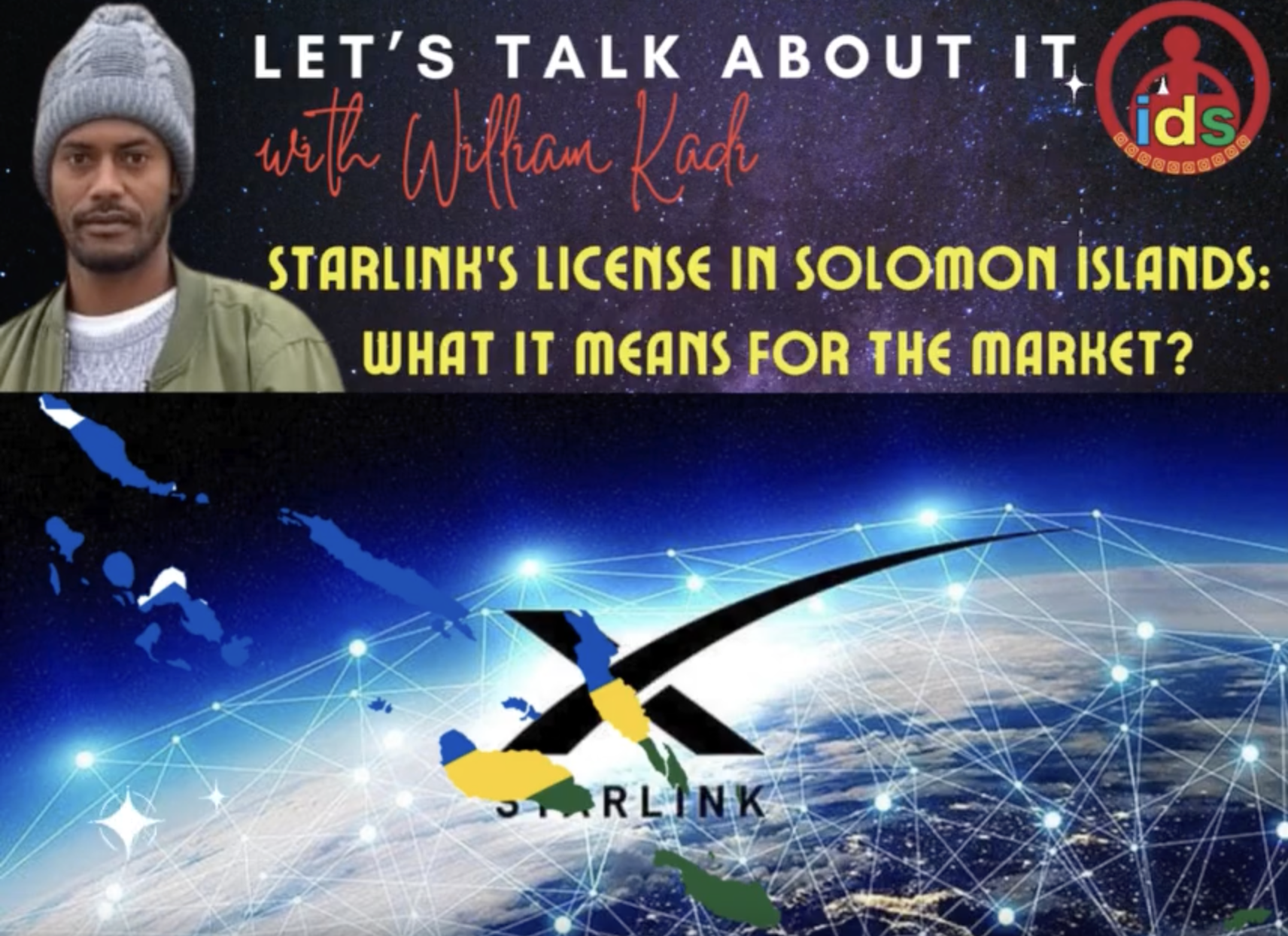

By William Kadi (Columnist)
The recent issuance of a license for Starlink to operate in Solomon Islands has generated considerable excitement and public interest.
In this article, we will explore the type of license Starlink has been granted, how it will function within the local market, and the role of the Telecommunications Commission of Solomon Islands (the Commission) as the regulator of telecommunications services.
Starlink has been awarded a class license, which comes with specific conditions set by the regulator.
The Commission has issued this license through a standard registration process, which places restrictions on the services Starlink can offer.
One significant limitation is the potential disabling of Starlink’s roaming service, a key feature of its global operations – but only to manage the scope of kits imported prior to the license.
This means that current Starlink kit owners and distributors in Solomon Islands will need to adjust their subscriptions and registrations to comply with the new licensing requirements.
Many of these kits, which were sold and distributed before Starlink’s formal entry into the market, were technically unauthorized.

Now, users will need to ensure that their equipment is in line with the terms of the class license.
Personally, as a Starlink user, I have seen firsthand the public’s strong demand for high-speed internet, particularly in a region where internet access is often slow and unreliable.
However, with the formalization of Starlink’s operations, there is now an opportunity to better regulate this service, ensuring compliance with Solomon Islands’ laws and the broader regulatory framework governing telecommunications.
Public Concerns and Compliance
The entry of Starlink into the Solomon Islands market has raised several questions and concerns, particularly around the regulatory framework.
Starlink Solomon Islands Ltd is registered as a foreign investment and must operate in accordance with local laws.
This means it is subject to taxation, competition rules, security protocols, and other business regulations that govern foreign entities operating in the country.
The class license allows Starlink to operate in the Solomon Islands, but its scope is much narrower than that of an individual license holder like Solomon Telekom Company Limited (STL).
For example, Starlink cannot fully penetrate certain segments of the market under this license, which may necessitate the outsourcing of some services, such as distribution and reselling.
While I am not an expert on the technicalities of telecommunication licensing, it’s clear that the restrictions placed on Starlink will shape how it competes with other service providers in the market.
The local telecommunications industry is evolving rapidly, with technological advancements driving changes.
Starlink’s presence adds a new dimension to this market, offering new possibilities but also presenting challenges, especially in terms of competition and regulatory oversight.
Trends and Challenges in Telecommunications
The global telecommunications industry is undergoing significant transformation, driven by new technologies and innovations.
Starlink, with its satellite-based internet services, is a revolutionary force in this space, but it is not without competition.
Key trends shaping the industry include increased focus on cybersecurity and resilience, the adoption of cloud services, advancements in artificial intelligence, and the ongoing deployment of 5G networks.
These trends are reshaping how service providers operate and what customers expect from their internet services.
With the introduction of Starlink’s high-speed internet service in Solomon Islands, several risks also arise, particularly in terms of data privacy and security.
Starlink’s satellite internet can provide unrestricted access to vast amounts of information on the web, which is both an opportunity and a challenge.
It creates new possibilities for business, education, and communication, but also exposes users to potential cybersecurity threats.
As such, the Commission will need to step up its regulatory efforts to ensure that data security and user privacy are adequately protected.
Existing laws may also need to be reviewed and strengthened to address the risks associated with this new technology.
The Role of the Telecommunications Commission
The Telecommunications Commission of Solomon Islands plays a crucial role in regulating the industry and ensuring that service providers comply with local laws.
The Commission has the power to issue regulations, directives, and orders that can amend, revoke, or restrict licenses as necessary.
Its role also includes market regulation, monitoring service quality, consumer protection, and assessing future trends in the telecommunications industry.
As Starlink prepares to activate its services in the Solomon Islands, the Commission will be responsible for overseeing the rollout and ensuring that the company adheres to the terms of its class license.
Starlink has already included Solomon Islands on its regional availability map, signalling that services will soon be activated – or have been activated already. Going forward, the Commission will need to monitor the importation of Starlink kits and assess how the distribution process is managed, particularly if Starlink partners with local players such as Solomon Telekom or smaller telecommunications companies.
Conclusion
The arrival of Starlink in Solomon Islands presents both opportunities and challenges. High-speed internet access can boost economic growth, improve education, and enhance communication, but it also brings risks related to data security and market competition.
As Starlink establishes itself as an alternative internet service provider, the Telecommunications Commission and the government must take a proactive approach to regulating the service.
Ensuring compliance with local laws, managing market competition, and safeguarding data privacy will be crucial to maximizing the benefits of Starlink’s presence while minimizing the potential risks.
The fast pace of technological advancement in the telecommunications sector will continue to challenge regulators, but it also presents an opportunity for Solomon Islands to harness new technologies for national development.
Effective collaboration between regulators, service providers, and stakeholders will be key to navigating this rapidly changing landscape.
